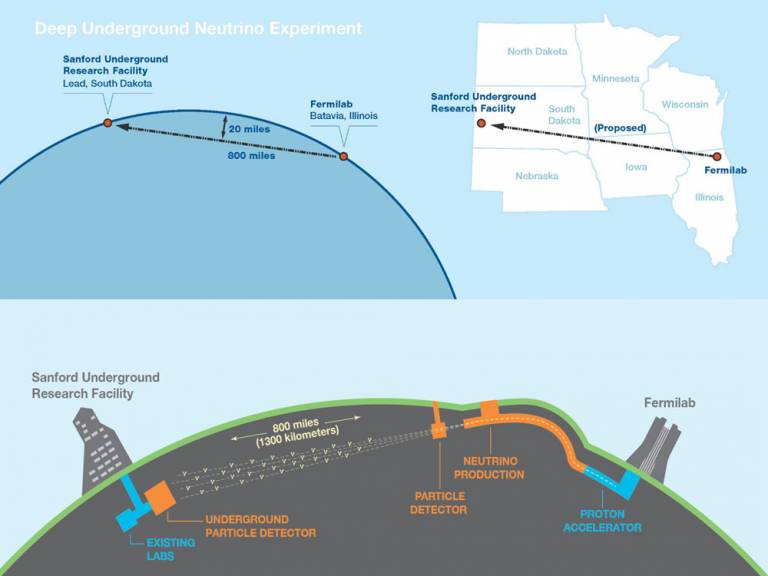UK pledges £65million to the Deep Underground Neutrino Experiment
21 September 2017
The UK is investing £65million in a US-based global science project involving UCL scientists that could change our understanding of the universe.

UK Universities and Science Minister Jo Johnson signed the agreement yesterday with the US Energy Department to invest the sum in the Long-Baseline Neutrino Facility (LBNF) and the Deep Underground Neutrino Experiment (DUNE), securing the UK's position as the international research partner of choice.
DUNE will study the properties of mysterious particles called neutrinos, which could help explain more about how the universe works and why matter exists at all. In particular, it will look for is the differences in behaviour between neutrinos and their antimatter counterparts, antineutrinos.
DUNE will also watch for neutrinos produced when a star explodes, which could reveal the formation of neutron stars and black holes, and will investigate whether protons live forever or eventually decay, bringing us closer to fulfilling Einstein's dream of a grand unified theory.
The UCL High Energy Physics Group has been involved with US-based long-baseline neutrino experiments for almost 20 years and with DUNE since its inception. They contribute valuable expertise in a wide variety of areas including computer simulations of the neutrino beam to the design and construction of technology for a DUNE prototype detector which is being tested at CERN.
Professor Ryan Nichol (UCL Physics & Astronomy) who leads UCL's involvement in DUNE, said: "UCL is working on multiple projects for DUNE and our next big focus is going to be on improving the reconstruction and simulation software used in the experiment. DUNE will generate a tremendous volume of data and sophisticated analysis techniques and algorithms will be required to extract the interesting physics that we all want to see this experiment deliver."
The UK's Science and Technology Facilities Council (STFC) will manage the UK's investment in the international facility, giving UK scientists and engineers the chance to take a leading role in the management and development of the DUNE far detector and the LBNF beam line and associated PIP-II accelerator development.
Professor Jon Butterworth, Head of UCL Physics & Astronomy, added: "The agreement is a significant step in securing future access for UK scientists to the international project. It gives upcoming and established researchers the opportunity to contribute to the next generation of detectors and continue to develop skills in delivering world-leading research and new cutting-edge technologies."
DUNE will be the first large-scale US-hosted experiment run as a truly international project at the inter-governmental level. It will involve more than 1,000 scientists and engineers from 31 countries building and operating the facility, including many from UK universities.
On signing the agreement in Washington DC, UK Science Minister, Jo Johnson said: "Our continued collaboration with the US on science and innovation is beneficial to both of our nations and through this agreement we are sharing expertise to enhance our understanding of many important topics that have the potential to be world changing.
"The UK is known as a nation of science and technical progress, with research and development being at the core of our industrial strategy. By working with our key allies, we are maintaining our position as a global leader in research for years to come."
Links
- Professor Ryan Nichol's academic profile
- Professor Jon Butterworth's academic profile
- DUNE
- UCL High Energy Physics Group
- UCL Physics & Astronomy
Image
- Illustration showing the 800-mile/1300-kilometer path from Fermilab to the Sanford Underground Research Facility, straight through the earth (source: Fermilab, credit: Sandbox Studios/Fermilab)
Video
- Small Particles, Big Science: The International LBNF/DUNE Project (source: Fermilab)
Source
Media contact
Bex Caygill
Tel: +44 (0)20 3108 3846
Email: r.caygill [at] ucl.ac.uk
 Close
Close

